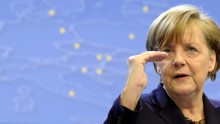While European Union struggles for unity and a new definition of itself, the US tries to act rather defensive in Europe. Past year’s crisis in Europe and the Russian aggression in Ukraine therefore marking a new leader of the West: it is Germany that more and more is engaged to solve problems and to set targets of a common policy. In Institute of World Policy in Kyiv, German Journalist Ali Aslan on June 16 analyzed how Germany is forced to take leadership in the world – and why Germans would prefer to avoid any leadership at all.
Working not only for German “Deutsche Welle” but as well for different other media and as a consultant of German Ministry of Internal Affairs, Aslan refers to experts on international politics. Nevertheless, just from the beginning of the event he marked out, that he wouldn’t rate himself as a specialist on Ukraine and the East. Spreading not official German points of view, but his personal impressions and experiences, he first of all explained the background of which Germany slipped into its leading position in Euro-crisis and war in Ukraine.
Though Germany during the past some 15 years from “sick man of Europe” developed to EU’s biggest player and, after the US and China, third biggest export nation of the world, yet most Germans wouldn’t realize how powerful their nation performs in the world. Historical reasons – the guilt of World War II – still today impacted German public, “instead of taking leadership most Germans today first of all would prefer to have its peace,” Aslan explained.
Beside this, German policy today tried to act mainly as a team player: Berlin would regard the interests of all other 27 European members in defining any position and before taking any step, no matter what would be the concrete question – and since different countries in EU claim different acts of Germany, the Federal Government often finds itself in ambivalent situation: “Some neighbors demand more German leadership, some are against a stronger position of Germany – it is nearly a Catch 22, in which Germany has to interpret its role.”
Being economically strong, but concerning military and soft power rather weak or inexperienced, the crisis in Ukraine finally marked a big upheaval of architecture of security in Europe. “It is a change of paradigms now: especially since even the US wants it that way, Germany is forced in leadership against Russia and has to unify the West against it.” Regarding the fact, that different countries of European Union are not too determined to cut off economical relations with Russia or invent sanctions, until now one could state a rather successful manner in doing so, rated Aslan the work of Merkel and Steinmeier – especially since even some members of Steinmeier’s social democratic party would prefer a rather integrative course towards Russia.
Rating the conflict between Ukraine and Russia, Aslan named the territorial integrity and the condemnation of the illegal annexation of Crimea as two fix points on agenda of German position. Though, supply of weapons or even sending of troops to Ukraine Berlin would in any case categorically exclude: “Germany thinks in terms of diplomacy, not of military,” Aslan underlined his analysis. But doing so, Merkel would be rather determined to continue this policy: “It seems, she believes in political solution of the conflict. Therefore, she is ready to sacrifice a lot: isolation of Russia is not too popular under representatives of German economy, where many clienteles of her party basically are to be found.” Though Merkel may have lost trust in Putin, whom Aslan named a “completely irrational acting figure,” she always must refer not only to her European partners, but as well the public opinion in Germany: “And everything else than a diplomatic solution would not be supported by a majority of Germans,” Aslan said, regarding that this may appear irritating and frustrating to many Ukrainians.
Another problem: same time, as crisis in Ukraine appeared, Europe itself goes to a deep crisis, not only economically and concerning the troubles of Greek and the Euro, but as well mentally. Aslan mentioned, more and more people in EU-countries would lose a certain image about the values Europe basically should be identified with. Political stability, a continent without borders and common currency and standards would be accepted as natural, while the deeper idea got lost somewhere somehow. Therefore, events in Ukraine could one day even help Europe, since it could recognize, “that its values and its model of society is so attractive, that in other countries – like Ukraine – people are ready to fight and die for to become part of it.”







